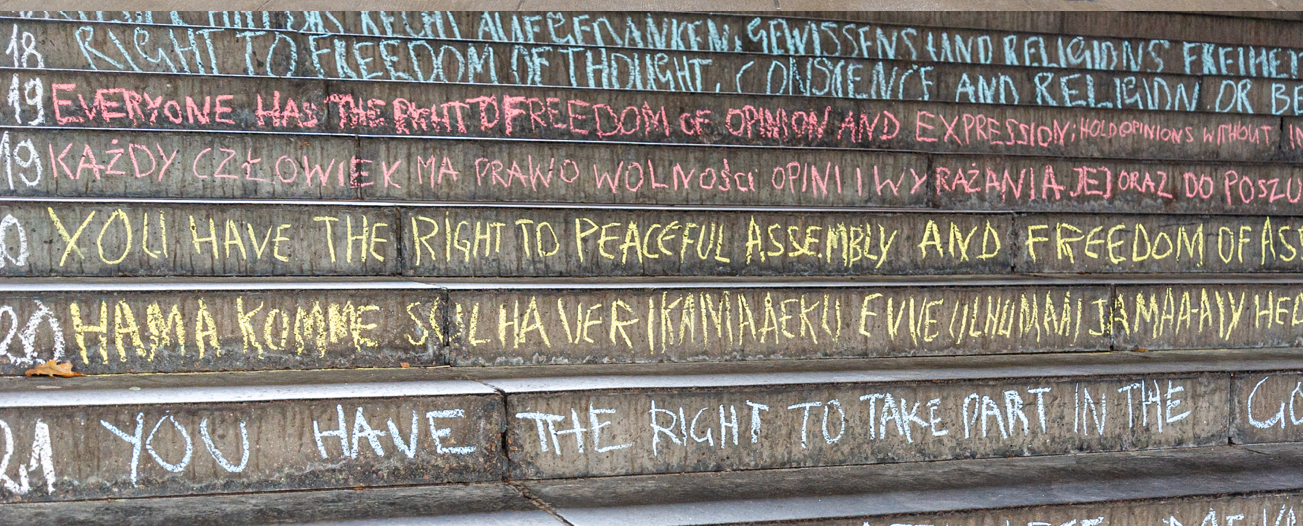
HU100 offers a comprehensive foundational knowledge of human rights from a multidisciplinary and global perspective.
This module covers key principles of human rights (freedom, equality, non-discrimination, universalism), a selection of key rights recognised in the Universal Declaration of Human Rights (life, freedom of expression, health, free trial, etc.), and some of the main challenges facing groups at greater risk of harm, disadvantage and discrimination (children, women, migrants and refugees, minorities).
- Module Supervisor: Tuba Turan

This course offers students the opportunity to learn techniques for systematic research in the field of Human Rights social science methodology. It also gives student the opportunity to probe deeper into specific issues of human rights. Human Rights specialists from a variety of backgrounds will examine how different disciplines approach human rights problems.
Course Objectives:
To equip students with the skills to identify, locate and retrieve books, articles, official documents and other documents relevant to research on human rights
To introduce students to key research methods, relevant for investigating human rights, in law, the social sciences and the humanities
To examine selected human rights issues in greater depth, with an awareness of the contribution of different disciplines in producing knowledge about them.
- Module Supervisor: Patricia Palacios Zuloaga
Section 1 - Sociological theory and human rights
We begin with an introductory lecture which looks at what classical sociological thinking might have to offer an understanding of human rights, and also consider some criticisms. We then move on in the second week to consider two competing contemporary attempts to formulate a sociology of rights, and in the third week to consider the problem of universalism versus relativism - that is, what does sociology have to say about different cultural values and perspectives in relation to universal rights? This section then ends with a look at the concept of cosmopolitanism, which challenges conceptions of society as bounded by the nation state and leads on to section 2.
Section 2 - Rights across borders
This second section of the module considers a more substantive question which can help to illuminate a sociological approach to rights, and that is the question of rights across borders. We begin with the position of trans-national migrants as compared with the citizens of host countries. Citizenship is the status that grants full membership of society and full rights, so an interesting question is how far universal human rights can over-come state sovereignty in the granting of rights to non-citizens. We consider this question in relation to the graduated system of rights which characterise most immigration regime, 'civic stratification', and look at specific examples related to gender and immigration, and to asylum seekers. Then we consider the other side of rights across borders by asking what rich countries owe to poor ones, and consider the implications of this material for debates about cosmopolitanism.
Conclusion - Researching meaning and agency
In the final week we will look at more practical questions of how to research human rights in a sociological manner, especially focussing on qualitative approaches to questions of meaning and agency. We take examples from a variety of scholars researching a range of different HRs issues.

Module Description
This course seeks to provide students with an in-depth understanding of the relevance and role of human rights to a number of contemporary issues. Topics are examined, such as exploring the meaning of rights for those most vulnerable and marginalised in society: women’s rights, minority rights, socio-economic rights & poverty, the rights of persons with disabilities and indigenous peoples’ rights.
Aims
-
To build and consolidate knowledge and skills gained in HU100 and HU200.
-
To examine the relevance and role of human rights to a number of contemporary issues.
-
To examine selected substantive human rights in national, regional and global contexts.
-
To introduce students to comparative human rights analysis.
Learning Outcomes
-
At the end of this module, students will demonstrate the ability to critically analyse select contemporary human rights issues from a range of different perspectives.
-
Students will evaluate key normative concepts and ideas, such as equality, human dignity and non-discrimination, and comprehend both the historical bases and the philosophical arguments underpinning the modern rights infrastructure.
-
Students will understand the various human rights frameworks (international, regional, domestic) and recognise how these interact with regards to specific human rights issues and cases.
-
Students, working both independently and collaboratively, will be able to synthesise and present human rights arguments in a coherent manner, communicating through their written outputs, in-class contributions, and oral presentations.
Syllabus
See attached syllabus from this year as an example. The syllabus may vary from year to year, but this will be announced to students in advance of their enrolment onto the module
Learning and Teaching Methods
Including number and format of contact hours, e.g. lectures, seminars, classes, practicals
Specify where students can find this information
20 weeks of combined lectures and seminars in 2h teaching blocks.
This will be stated on the module directory.
Assessment
Coursework: 100%
Coursework:
-
One 3,000-word essay in the spring term worth 35% of overall mark.
-
Two short 1,500-word reports in the autumn term, worth 17.5% each (combined 35%).
-
A group presentation on a human rights topic to be delivered in the summer term. The teaching team will evaluate the group presentations, and there will be an associated individualised component – a 1,000 word reflective statement regarding the epistemological journey and the process of doing a group project. 20% of the overall mark will be awarded for the group presentation and 10% for the reflective statement.
This module will be assessed by three different kinds of coursework:
-
a 3,000-word essay on a topic covered in the Autumn Term;
-
two 1,500-word reports, one each on the two topics covered in the Spring Term; and
-
a group presentation and 1,000-word reflective statement on a human rights topic (covered in either term or researched independently). Groups generally will consist of four students – the final presentation will be 25 minutes long, giving individual students 5 minutes each for their respective contribution, and 5 minutes at the end for questions and answers, comments and reflections from the assessment panel. The presentation and the statement are due in Summer Term.
Assessment details
Weighting of coursework:
|
Description of unit of assessment (for exams, specify when the exam will be) |
Length / Duration |
Submission Date |
Weighting |
Learning Outcome(s) met |
|
Essay |
3,000 words |
Week 16 |
35% |
1 |
|
Two reports |
1,500 words |
Week 30 |
35% (17.5% each) |
1 |
|
Group Presentation |
25 min. |
Week 33 |
20% |
1 |
|
Reflective statement |
1,000 words |
Week 34 |
10% |
1 |
- Module Supervisor: Aoife Duffy